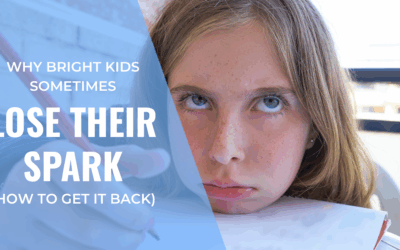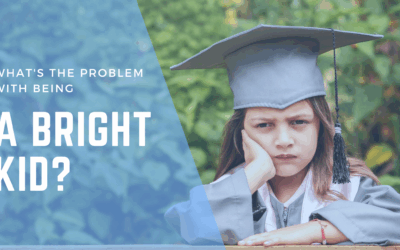Gifted students often appear to breeze through school on natural abilities. From a distance, their giftedness appears to manifest as great grades and an easy high school experience. But far too often, that appearance masks a lack of self-awareness and of basic coping skills like time management and resilience. Long-term success—the kind that carries through adulthood—isn’t seen only in grades and SAT/ACT scores, but rather in the self-support habits that are best developed early.
When most gifted kids face real challenges, like in college or the workplace, they can struggle to adapt. Without the right support and the right skills developed early, this transition to independence can be overwhelming, leading both to confidence crises and frustration (in the short term), and lost potential and derailment of possibilities (over the long term).
The challenges you might not see
It’s easy to look at a gifted student’s success and assume that they have it all figured out. But often, there are hidden problems beneath the surface—issues that only show up when their “challenges” actually start to challenge them.
1. The limits to coasting on natural ability
Because things generally feel easy to them, most gifted students skimp on building study skills and developing self-awareness. Without an understanding of how they learn best, most gifted students also lack the tools to figure out challenges on their own. Because things have always come easily to them, they haven’t trained either the muscle or the mechanics of persisting through difficulty.
In fact, many gifted students haven’t just failed to develop resilience—they’ve developed the opposite instinct. Most successful people, when faced with something difficult, take a deep breath, try something different, and adapt. But gifted students are often conditioned to think: If it’s hard for me, it must be impossible. So they retreat—not because they’re lazy, but because they’ve never learned how to struggle productively.
2. Perfectionism and fear of failure
If your gifted student is also a perfectionist, they may find it hard to learn new skills. After all, beginners are no good at what they’re doing—that’s in the very nature of being a beginner. But real learning happens in those moments when failure exposes the gap between what they thought they knew and what they actually know.
Many gifted students grow up measured by grades, GPA, and test scores, which trains them to tie their self-worth to metrics of “achievement”. This mindset makes it difficult to engage with new or complex ideas, especially if success isn’t guaranteed or measured. Instead of leaning into the learning process for the sake of their own growth, they may avoid challenges that put their “gifted” identity at risk. Our gifted kids have the potential to become movers and shakers, but only if they can lean into challenges without being blocked by this powerful psychological threat to their identity.
All people are protective of their strengths. Popular people guard their reputations. Wealthy people guard their money. Tidy people curate their belongings. Gifted students, likewise, guard their intellect and academic self-image. They may not even realize they’re doing it. But this vigilance often gets in their way: it prevents them from doing the very things that are required to maintain and grow their edge. Things like taking intellectual risks. Asking for help. Trying a new way.
At some point, the other shoe drops and the red flags expose themselves – one day, these students inevitably face a challenge that’s necessary for their growth, and they crumble because they lack the skills they need to persevere constructively.
3. The identity trap
Gifted students are often labeled “the smart kid” early on, and this identity can become a trap. When they encounter a situation where they’re no longer at the top of the class, most often when they take their first AP course, or even when they get to that top-tier college they’ve been dreaming of, it can be crushing. Their confidence tanks, not because they lack ability, but because their sense of self is so tightly tied to being the best. It’s ironic, tragic, and most importantly, avoidable.
This loss of identity is a missed opportunity for growth. It’s a reminder that natural ability, without high-functioning habits and a willingness to be bad at something on the way to being good, will only take them so far. This growth mindset, if developed at an early age, is the edge that gifted students can carry with them for the rest of their lives.
We know from experience that the same gifted students who struggle can thrive when they adopt a new set of beliefs and skills.
What successful independent thinkers believe

So what does it actually look like when gifted students make the leap to independence? These are the beliefs and habits we see in students who thrive in college and life beyond it.
1. They take on challenges
Successful independent thinkers seek out challenges. They understand that effort is a sign of growth, not of weakness; they understand that skill-building is more important than appearances. (Eventually, this also spills over into executive function skills like time management and organization, but this often comes much later.)
When school feels too easy, they look beyond it. That might mean diving into a tough personal project, picking up a new skill, or exploring a subject that’s outside their usual strengths. They know that growth lives outside the comfort zone.
When approaching something new, a low-pressure environment helps them absorb knowledge and reflect deeply. Starting early gives them space to stumble, rethink, and get better. Unfortunately, this is not how most current high-schoolers experience their environment.
They also understand that interests matter. Just because they’re good at something doesn’t mean they have to love it. They give themselves permission to pursue what lights them up. It’s clear to those whose job it is to evaluate character—like college admissions officers—whether a student is pursuing an activity out of pure passion, or to pad a resume.
2. They see failure as feedback
To a successful independent thinker, failure isn’t the end—it’s the path.
They’ve come to expect that life will involve problem-solving, struggle, and imperfection. They know that if something is hard, then it’s a sign that they’re learning, not a sign that they’re incapable.
They reject the false link between achievement and character. They understand that grades don’t define them. Many even find strength in stories of failure, like hearing about the student who got a C in Quantum II at MIT and still went on to succeed. The student who bombed all his courses because he spent too much time on the one course he loved, and then had to figure out how to keep those poor grades from getting in the way of future success. These stories (true stories of people on the WCTC team, by the way) reframe what success actually looks like: resilience and flexibility, not perfection.
3. They thrive in supportive, honest environments
Of course, such environments are helpful to everyone. But these students especially need honest support in order to grow in four key ways:
- They’re honest about what they don’t know and curious about getting better. When someone spots a mistake, they don’t panic or deflect; instead, they address it directly. They appreciate it—and often say something like, “Oh yeah, I tend to miss that step.”
- They want guidance, not hand-holding. Early on, they benefit from scaffolding—like being asked the right guiding questions—but over time, they internalize those questions and begin to coach themselves.
- They also understand how they learn. One student might “see” the shape of a math problem but dislike rote memorization. Another might excel in structured repetition. Independent learners reflect on these differences, knowing that awareness is a competitive edge.
- They make note of what doesn’t sit right, what feels unclear, and what they want to explore further. And when they need help, they know how to find reliable sources and ask the right people.
What to do about it all

Gifted students often struggle to turn natural talent into consistent, high-level performance without burning themselves out. They need more than just encouragement; they need to learn how to embrace challenges and learn from setbacks.
That’s where Wes Carroll Tutoring and Coaching can help. We help gifted students develop a true growth mindset—the kind that comes from facing challenges head-on, learning from failure, and building resilient, independent learning habits. We’ve seen firsthand that those who master this skill not only use failure as a stepping stone but wind up climbing far higher than even their own ambitions would have them believe possible.
Want to discuss this further? Let’s talk.




0 Comments